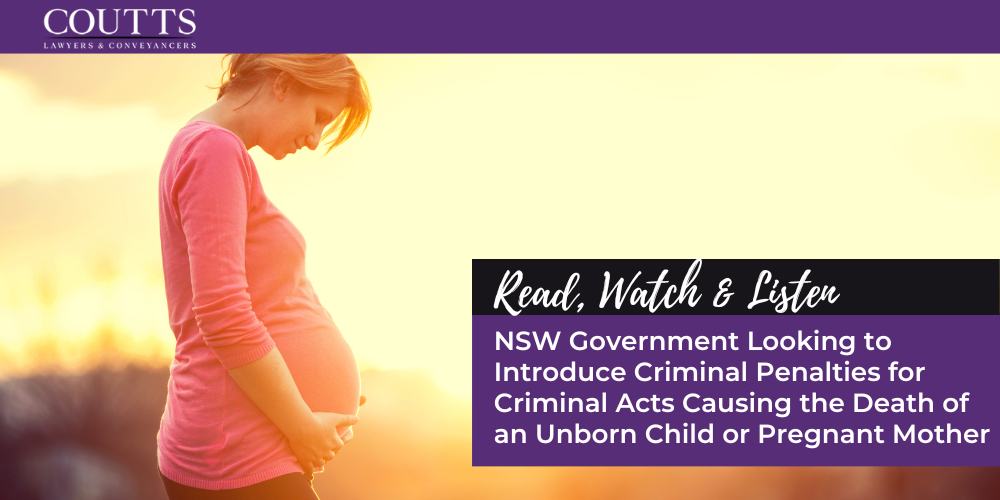KEY TAKE-OUTS:
- The NSW Government has plans to introduce new legislation setting out a range of criminal offences and penalties for persons who cause the loss of an unborn child or the death of a pregnant mother through criminal acts.
- Currently, there are no laws which cover the offence of causing the loss of an unborn child. The proposed laws are intended to recognise the heartbreak suffered by families and adequately punish offenders for the loss of life of the mother and/or unborn child.
- The Crimes Legislation Amendment (Loss of Foetus) Bill 2021 is intended to introduce two new offences under the Crimes Act 1900 (NSW) of ‘causing the loss of foetus’ and ‘causing the loss of foetus (death of a pregnant woman).
- The proposed penalties for such offences range from 3 to 28 years imprisonment, depending on the type of act which results in the death of an unborn child or pregnant woman.
The Attorney General, Mark Speakman, has announced a set of reforms proposed by the NSW Government to punish persons who cause the death of a pregnant woman or their unborn child through criminal acts. The reforms are intended to recognise the significant heartbreak and devastating loss suffered by families who lost relatives in this way. Most commonly, these cases arise as a result of dangerous driving by a third party. At present, there are no offences in NSW which specifically cover the death of an unborn child or pregnant mother through criminal acts.
The proposed laws would create new offences under the Crimes Act 1900 (NSW) for two separate offences:
- A stand-alone offence of ‘Causing the loss of a foetus’. This offence is intended to apply to a wide range of criminal acts and carry a maximum penalty of 5 to 28 years imprisonment depending on the type of act (such as dangerous driving or grievous bodily harm with intent to the pregnant woman). The combined maximum sentence for this offence and the existing criminal offence for the criminal conduct will be 3 years higher than currently available for this conduct under existing law.
- An offence of ‘Causing the loss of a foetus (death of a pregnant woman)’ which can be charged with a homicide offence (such as murder, manslaughter, dangerous driving occasioning death) where the foetus is lost and the pregnant woman is killed due to a third party criminal act. This offence will carry a maximum penalty of 3 years imprisonment and apply in addition to the maximum penalty for the homicide offence.
Interestingly, the offences are said to apply where the foetus is at least 20 weeks or 400 grams in weight. However, it is important to note that these laws will not encroach on the reproductive rights of women, as the offences will expressly exclude any act or omission by the pregnant woman.
In addition to creating new criminal offences to punish offenders, the proposed reforms are intended to provide support to victims and their families and greater recognition of their interests in the trial and sentencing process. Victims and their families will be able to make a victim impact statement which the court can take into account when deciding an appropriate sentence and they will also be able to claim funeral costs for the unborn child caused by a car accident. Further, the name of the unborn child lost as a result of the criminal offence will be included in the indictment.
The Crimes Legislation Amendment (Loss of Foetus) Bill 2021 setting out the proposed suite of reforms is set to be considered by the NSW Government this month.
info@couttslegal.com.au
1300 268 887
Contact Coutts Lawyers & Conveyancers today.
This blog is merely general and non-specific information on the subject matter and is not and should not be considered or relied on as legal advice. Coutts is not responsible for any cost, expense, loss or liability whatsoever to this blog, including all or any reliance on this blog or use or application of this blog by you.



